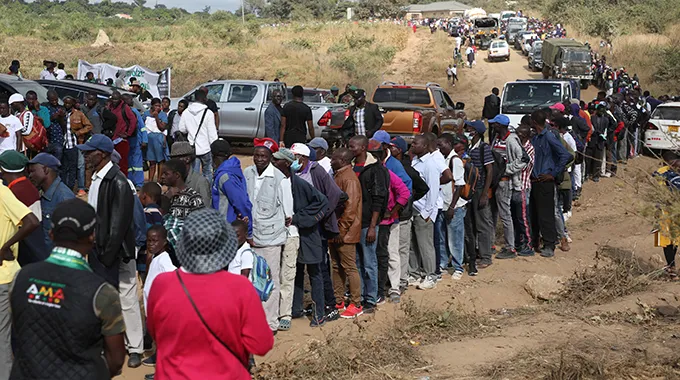
"VENE vayeni vauya,” noted Taurai Mahweni, a Mt Darwin native as hundreds of new, gleaming top-of-the-range SUVs swooped on the sleepy town which had been selected to host this year’s national independence celebrations.
The flabbergasted Mahweni had basically said: The owners of the country have arrived.
Lying 160km northwest of the capital Harare, Mt Darwin was the beneficiary of President Emmerson Mnangagwa’s new policy to “leave no one and no place behind”.
Except that coming from Harare, the town is like stepping onto another planet altogether.
The road to get there has potholes, but is in good shape compared to other places.
While officially run by a town council, it has the feel of a growth point, and lack of development is distinct despite the honour of hosting national independence celebrations.
Perhaps that in itself was a reminder of just how far behind it has fallen in terms of national development, 43 years after the country unyoked itself from colonialism.
Some of the best-known leaders and politicians in the country hail from here: Former Vice-President Joice Mujuru, who attended the celebrations, was born in the area, as was former minister Saviour Kasukuwere, businessman and politician James Makamba and former Finance minister, the late Chris Kuruneri, among others.
- Mr President, you missed the opportunity to be the veritable voice of conscience
- ED to commission new-look border post
- Zanu PF ready for congress
- EU slams Zim over delayed reforms
Keep Reading
It was not supposed to be like this for Mt Darwin, named after British naturalist Charles Darwin and probably the site of some of the earliest European missionary work in southern Africa, by the Portuguese Jesuit, Gonçalo da Silveira in 1560.
It may explain why the missionary-run Karanda Hospital in its vicinity remains one of the best run, if not the most overworked and functioning health institution in the country.
For two days, the town was the home of the “who is who” as the political leadership of the country, senior government officials and ruling party Zanu PF associated business people put on a show of State power and wealth, being seen to be on the same page with the regime.
From the daily hustle of buying and selling, digging for gold and farming the patched ground, the locals came to see the drills by the prisons, police and army bands, and for most of the audience, a once in a lifetime opportunity to watch two biggest names in sports in the country, Dynamos and Highlanders, in action live were some of the drawcards.
The newly-rebuilt Pfura Stadium will probably never witness topflight football in our lifetime, but having Bosso and DeMbare “christen” the ground certainly was enough compensation.
There was, of course, the sungura king Alick Macheso to keep them on their toes and take away the boredom of the political spectacle in front of them.
With a single fast-food outlet in town, ironically called Huku Mukati, the truckloads of Chicken Slice fast-food, and Pepsi drinks were a treat.
When all is said and done, the widespread poverty and suffering faced by many locals was inescapable.
To watch all the opulence on display, the locals must have felt they belonged in a different age to their visitors.
Zimbabwe, they observed, has become one of the most unequal societies in the world.
So, after the fascination with the once in a lifetime opportunity to witness first-hand how the rich and powerful who ruled their lives lived, it was back to the daily hustle of putting food on the table and looking for school fees for their children.
Leaving no one and no place behind?
Mt Darwin is among the many places long left behind and the observation by Mahweni was apt: the country has its owners and they are not part of them.
That message was loud and clear, whatever mantra the politicians made them shout while munching on the fried chicken.







